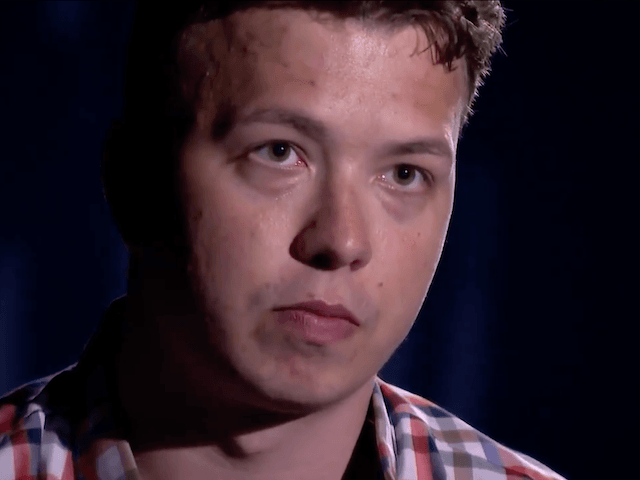Dissident Belarusan journalist Roman Protasevich, kidnapped by the Belarusan state when it hijacked a commercial airliner on May 23, appeared on Belarusan state television on Thursday praising dictator Alexander Lukashenko as a man with “balls of steel.”
Protasevich, 26, is an online journalist and activist headquartered in Poland. He drew the ire of Lukashenko’s regime by covering massive protests in Belarus after an August presidential election widely seen as rigged. Before that, Protasevich was a teenage activist against Lukashenko, who has been in power since 1994 and is the only president in the history of Belarus. He fled to Poland in 2019 because he feared retribution from the KGB – the name Lukashenko still uses for his secret police, decades after the fall of the Soviet Union.
On May 23, after attending a conference in Greece with Belarusan opposition presidential candidate Svetlana Tikhanovskaya, Protasevich’s flight to Lithuania was intercepted by Belarusan authorities and forced to land in Minsk, ostensibly because of a bomb threat. Protasevich was kidnapped off the plane by Lukashenko’s agents. Fellow passengers on the plane said Protasevich feared he would be tortured and killed.
The day after he was taken off the plane, Protasevich appeared in a “confession” video in which he said he was guilty of organizing “mass unrest in the city of Minsk.” He said he was being held in a Minsk detention center, and although he was visibly bruised in the video, he insisted he was being treated well and voluntarily cooperating with investigators.
Protasevich’s 23-year-old Russian girlfriend Sofia Sapega, also kidnapped off the plane that was forced to land in Minsk, has also appeared in “confession” videos in which she claimed she plotted to release the personal information of Lukashenko regime officials. No evidence has been presented that she ever engaged in such activity.
In the new video released on Thursday, Protasevich said he “pleaded guilty immediately” after he was charged for organizing “unsanctioned protests” in August.
Protasevich praised the dictator he spent his entire adult life investigating and denouncing, repeatedly referring to Lukashenko in a friendly manner as “Alexander Grigoryevich.”
“I won’t hide it, I criticized Alexander Grigoryevich a lot. Of course, because it seemed to be that there were reasons for it. I’ve been a journalist my whole life, but the more I was getting involved in political work, the more I wanted to run away from it,” he said of his career as a critic of the regime.
“I realized that much of what Alexander Grigoryevich was criticized for was an attempt to pressure him. And in many ways he acted like a man with balls of steel despite the pressure,” he said.
Protasevich disavowed his support for the Belarusan opposition and regurgitated Lukashenko regime propaganda, portraying the massive protests against the dictator’s rule as a plot concocted by Poland and Lithuania so they can “make loud statements with the approval of the collective West.”
Protasevich wept during the interview and said he would never return to his old career.
“I have rethought a lot of things for myself. I never want to get involved in politics anymore, in any dirty games and showdowns again. I want to hope that I can correct everything and live an ordinary peaceful life, to have a family, children, stop running away from something,” he sobbed.
Protasevich indicated during the interview that he feared being handed over to the Russian-backed separatist movement in Ukraine, an extradition request Lukashenko is reportedly considering.
Protasevich’s friends and associates said the new video was clearly filmed under duress. An advisor to opposition leader Svetlana Tikhanovskaya said on Thursday the forced confession videos are “painful” to watch.
“His parents believe he was tortured. This is not the Roman I know. This man on Goebbels’ TV is the hostage of the regime, and we must make all possible to release him and the other 460 political prisoners,” adviser Franak Vlacorka said, comparing Lukashenko’s regime media to that of Nazi Germany.
Human rights groups pointed to visible signs of torture on Protasevich in the new video and noted the regime has perfected additional means of torture that leave no visible marks, while his father said his confession was clearly coerced.
“I know my son very well and I believe that he would never say such things. They broke him and forced him to say what was needed. No one should believe these words because they were beaten out, through abuse and torture of my son,” Dmitry Protasevich said.
“It’s not him speaking, and you can see he is fighting with himself when he is delivering what they want him to say. Perhaps they threatened to kill him or his girlfriend,” the elder Protasevich postulated.

COMMENTS
Please let us know if you're having issues with commenting.